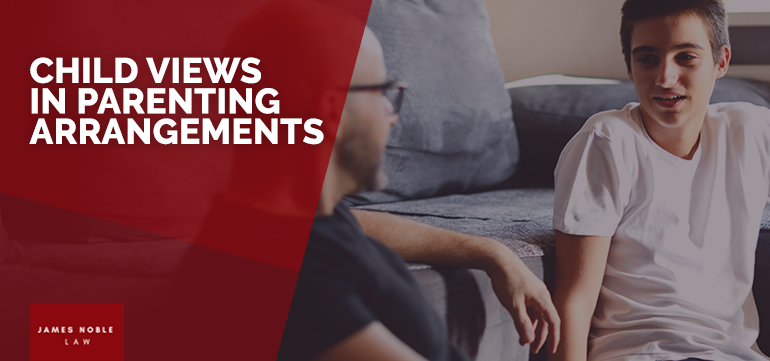
CHILD VIEWS IN PARENTING ARRANGEMENTS FOR THE 0-4 YEAR AGE GROUP
 How the Child’s View Affects Custody Disputes?
How the Child’s View Affects Custody Disputes?
Before imposing an order, the Court will always consider what Parenting Arrangements are in the best interests of the child. In determining the best interests of the child, any views expressed by the child will be taken into consideration.
During this process, the Court will place appropriate weight to these views depending upon various factors such as the child’s maturity and understanding of the situation.
As children of mature age are more likely to grasp the concepts of separation, split custody, and parenting arrangements, the Court is likely to place far more weight on the views of children between the age bracket of 14 – 18 years.
Studies indicate children within this age bracket are more likely to comprehend complex situations such as parenting arrangements as opposed to children less than 10 years. Child support becomes a serious issue when families separate and follow the parenting agreement.
Areas of Proposed Reform Parenting Arrangements for the 0-4 year age group
Although the current law encompasses the views of all children under the age of 18 years, the Queensland Family and Child Commission has recently proposed recommendations to the Australian Law Reform Commission that the views of younger children should be considered with more weight.
The recent submission made to the ALRC considers a child’s views are significant, regardless of age or maturity.
The submissions seek to further promote the meaningful engagement younger children have with the parenting arrangements process. These notions have been publicly backed by child protection organizations such as Bravehearts and Uniting Care who believe the voice of the child needs to be heard in all situations.
Do These Changes Have a Downside?
 Despite having practical applications, these submissions may be premature in placing significant weight on infantile children’s views. Family Law Experts have indicated reform of this area may lead to parenting arrangements that may seem in the child’s best interests, but ultimately fail to address underlying concerns such as manipulation and bribery.
Despite having practical applications, these submissions may be premature in placing significant weight on infantile children’s views. Family Law Experts have indicated reform of this area may lead to parenting arrangements that may seem in the child’s best interests, but ultimately fail to address underlying concerns such as manipulation and bribery.
Social studies indicate many children between the ages of 8 – 12 show preference towards the “fun” parent, whilst the parent who enforces discipline is viewed negatively. In cases involving a 50/50 custody dispute, if the views of the child are given more weight, this could be unfairly detrimental to one parent in the proceedings.
Therefore, despite the child having a negative view of the disciplinary parent, enforcement of punishment is likely to be in the child’s best interests. This is supported by studies indicating young children are often unconsciously influenced, or in some cases manipulated, by one parent proving excitement and gifts.
If a child in this situation was asked which parent they would prefer (without the necessary maturity and understanding) the answer may indicate a decision they do not fully comprehend, and, one which is not within the child’s ultimate long-term interests.
How Can These Pitfalls be Avoided?
To avoid unnecessary manipulation and bribing of children by parents, emphasis may be placed on expert third-parties which could assist the Court in determining the underlying views of the child. Persons such as Family Report Writers, Independent Children’s Lawyers, Psychologists, or Counsellors can be integrated into this process to ensure the child’s views are understood.
This integration would also act as a safeguard to prevent parenting orders from being influenced by wrongly founded child views resulting from bribes or manipulation.
Need a quick & clear idea for Divorce Property Settlement? – Watch this video by James Noble
This may help you understanding if you still interested to Maintain a working relationship with your former partner after separation.
Need help?
For more information, Please contact the Brisbane family law team at James Noble Law today for a FREE, no-obligation 20-minute consultation. To schedule an appointment with one of our Qualified and experienced Family lawyers Brisbane.
Find Brisbane family lawyers on Google Maps near you.
You may also like to know more information about the
- Mother withholding child from father Australia.
- Parental Responsibilities and Legislation.
- The different types of Child Support Arrangements.
- Parenting Plan About Future Care Arrangements for your Children.
- Spousal maintenance qld, Brisbane, Australia.
- What is section 61da(1) | Criminal law in Family Law proceedings.
- Learn about family court portal.
- Family law brisbane solicitors.
- How to prepare family reports?
- Learn about the family Law act 1975
- Online Divorce application In Australia.
- Get in touch with brisbane family lawyers


 How the Child’s View Affects Custody Disputes?
How the Child’s View Affects Custody Disputes?